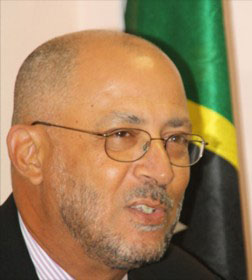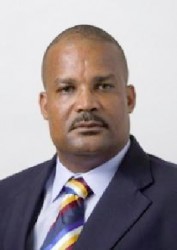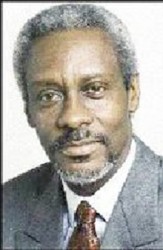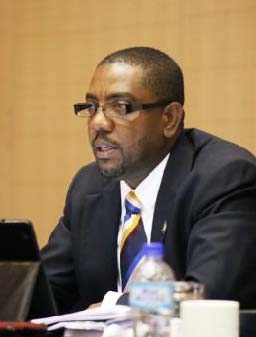 The news that former West Indies team manager Ricky Skerritt is going to challenge incumbent Dave Cameron for the post of president of Cricket West Indies (CWI) at the upcoming annual general meeting on March 24 was met by skepticism in some quarters and optimism in others.
The news that former West Indies team manager Ricky Skerritt is going to challenge incumbent Dave Cameron for the post of president of Cricket West Indies (CWI) at the upcoming annual general meeting on March 24 was met by skepticism in some quarters and optimism in others.
The optimists were glad that there would indeed be a challenger to Cameron’s seeming stranglehold on the post and hopeful that Skerritt’s challenge would result in a change of the leadership of the region’s number one sport.
The skeptics were however doubtful that Skerritt, a former Minister of Tourism in his native St Kitts/Nevis, and his running mate Dr Kishore Shallow, would be able to succeed where others have failed.
Cameron, a director of the then West Indies Cricket Board (WICB) since 2002 has been at the helm of the regional body since 2013 and though his tenure has been largely unpopular he has resisted the obvious desire of many cricketers and fans alike to just go away.
In fact, he has taken on not only his challengers and detractors but also CARICOM, resisting that body’s many suggestions of a complete overhaul of the governance of the sport, supported by two reports commissioned by the regional body itself – the Patterson and Wilkin reports not to mention a report by Dr Keith Mitchell, then Chairman of CARICOM’s Cricket Governance Committee.

The Patterson Report, which was presented to the board in October of 2007, criticized the administration of the game, the relationship of the board with its players association and with CARICOM governments and called for the setting up of a West Indies Cricket Commission with representatives from all major interest groups in an effort to give the Caribbean public a sense of ownership among other things.
Likewise the Wilkin Report also made recommendations for reform of the board and though the WICB later said that the territorial boards had agreed to implement 10 of the 17 recommendations of the Wilkin Report, it is unclear whether the recommendations were in fact implemented.
What transpired next was an apparent falling out between the two with the WICB claiming that Wilkins had resigned as Chairman of the Governance Committee and Wilkins indicating his reason for so doing.

“The blunt refusal of the territorial board members to follow their own stated principles casts serious doubt on their commitment to the rest of the strategic plan and their capacity to implement same,” he wrote.
Recently Skerritt, a former Rhodes Scholar and Shallow, have been finding out first hand just how tight knitted those in charge of West Indies cricket are and to what extent they will go to remain in control of the region’s sport.
According to Skerritt, they wrote requesting an opportunity to make a pitch to the voters but were denied.
“We wrote to directly to the Presidents and the Boards, asking only for the opportunity to present our plan for change,” he said. “We did not ask for their support or for a nomination.”
“Three boards – Barbados, Guyana and Windward Islands – wrote back in a matter of days, all turning down our request, almost in tandem.”Skerritt said.

“In the case of Guyana, we noted that they had chosen to nominate Dave even before the nomination process was open,” he added.
Skerrit’s running mate Dr Shallow blasted the decision by the three area boards.
“This type of blind, unrelenting support without even exploring leadership options or alternative ideas contradicts the democratic process and is probably not reflective of the majority base of members who they represent,” he said.
The Barbados board president Conde Riley, however, attempted to justify his board’s decision not to listen to Skerritt’s and Shallow’s presentation.
He said the request by Skerritt and Shallow was discussed by the BCA and a decision was taken to support the incumbents Cameron and Emmanuel Nanthan.
“Once the board decided that they were supporting the incumbents that was it. You can’t come out and go against something that has been agreed on a vote by the full BCA board,” said Riley.
Unfortunately, this is the modus operandi of not only the board representing West Indies cricket but most sports associations.
There is a blatant attempt by those in authority to remain in power by whatever means necessary even to the extent of oppressing the opposition resulting in an uneven playing field, a lack of transparency and fairness.
Game over? ——subhead
So is it game over for Skerritt and Shallow?

With three area boards fully behind Cameron/Nanthan, it would of course, seem so.
Of course there are three other area boards in Trinidad and Tobago, Jamaica and the Leeward Islands, so all is not lost.
There are 12 directors, two from each of the six associate territories along with two independent directors who have been selected by the incumbent. It all appears to be game over, game, set and match to Cameron and Nanthan unless of course, the voters use their conscience.
The present dilemma affecting the administration of sports in the many Third World countries in the region is that decisions to run for office are not about any inherent desire or long term plans to develop the sport or to help the athletes reach their full potential.
No!
It is all about the officials and the many perks, privileges and benefits they get from being in positions of power which is why term limits for those positions need to be implemented speedily.
It is difficult to implement changes of any kind be it constitutional reform or simple term limits for officials, because the clique that controls West Indies cricket does so with an iron fist and refuses to let go of its control of the sport in general and the purse strings in particular.
One does not need to go into the litany of problems facing West Indies cricket which Cameron has presided over including the abandoned tour of India, Darren Sammy’s comments following the West Indies T20 World Cup win and his subsequent banishment, the Darren Bravo issue, the fact that the regional team continues to languish near the bottom of the ICC rankings, the recent appointment of Richard Pybus and one can go on and on.
Yet, even in the face of his obvious mismanagement of the sport, Cameron remains unmoved and even has the temerity to run for another term. He is behaving as if West Indies cricket is his wholly and solely.
This is why CARICOM, despite the reluctance of the International Cricket Council (ICC) to intervene, should forge ahead with its plans for the restructuring of the region’s cricket board even if it means taking tough decisions, for after all, no government, no organization and more importantly, the people of the Caribbean to whom cricket belongs, should sit idly by and watch the region’s sport be hijacked under the guise of “democracy.”





